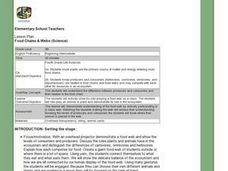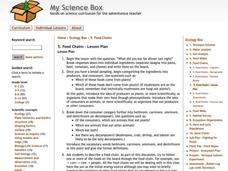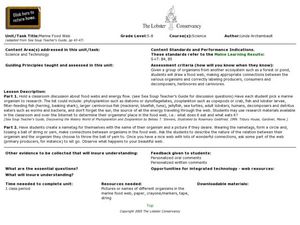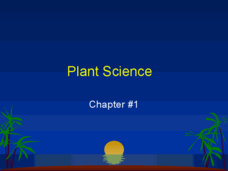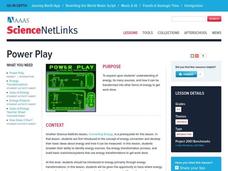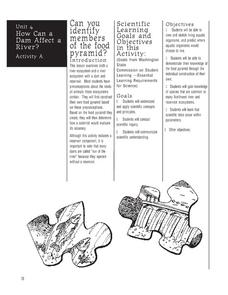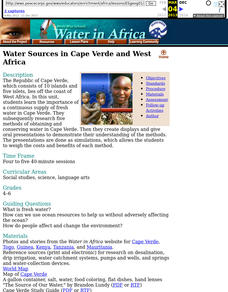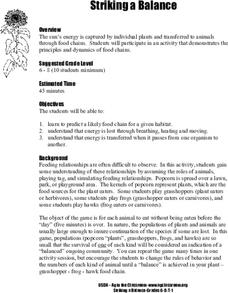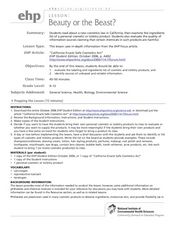Curated OER
Food Chains & Webs
Fourth graders examine roles of animals in food chain, explore roles of humans, plants, and animals in ecosystem, create their own food webs, and role play producers, consumers, and decomposers.
Curated OER
Food Chains
Young scholars describe food cahins and the role of organisms. Using a set of organism cards, they color code the organisms on their cards by their role in the food chain. Once a complete chain is identified, they glue it on a sheet of...
Curated OER
Food Webs in the Barnegat Bay
Students investigate the food webs in the Barnegat Bay. In this organisms activity, students use a graphic organizer to illustrate the types of consumers in the bay. Students use reference books to continue to research the animals found...
Curated OER
Marine Food Web
Students investigate the effects of the food chain on all animals by creating a food web. In this seafood instructional activity, students discuss energy flow and research a specific marine organism of their choice. Students create a...
Curated OER
Food Webs
Young scholars produce a newspaper covering topics related to food webs. They use print and electronic sources to gather information about specific animals. They share their information with the class.
National Park Service
Nutcracker Fantasy
The Clark's nutcracker bird hides seeds in 25,000 different sites every year to save for winter. Lesson demonstrates how difficult it would be to find these seeds months later when they need them for food. In the first of five lesson,...
Curated OER
Plant Science Chapter #1
It may not stand as a cohesive presentation, but individually you may find a use for these slides. One slide describes how civilization began once man learned to plant and harvest food. Another explores the population growth over time....
Curated OER
Food Packaging
Students identify the functions of packaging food and how the designs work. In this food packaging instructional activity students identify the changes that occur in different types of materials.
Curated OER
Good Food Explorers
Students use different food items in order to practice the mathematical concept of shape recognition. At the same time the teacher explains how crops are a source of physical health. They use all five senses to describe each food item...
Curated OER
Power Play
Once your physical science stars have a grasp of the different forms of energy, use this resource to get them putting the energy to work. Small groups choose from seven different project options and work together to build an energy...
Foundation for Water & Energy Education
How Can a Dam Affect a River? Activity A
Written for Washington state students in life science, this lesson provides an opportunity to examine the residents of local freshwater habitats. You or the class collects a water sample, and learners try to examine what organisms live...
Curated OER
The Source
Youngsters listen to the teacher read an excerpt from the story, The Source. The goal of the lesson is to have them begin to get an idea of where many foods and fibers come from. The lesson has the teacher stop reading at many points in...
Curated OER
Water Sources in Cape Verde and West Africa
Young explorers study the scarcity and importance of a continuous supply of fresh water in Cape Verde. They research the five main ways that fresh water is obtained in these countries. Each research group prepares a presentation, and...
Curated OER
What Does Earth Day Mean? - Biology Teaching Thesis
Students possible sources of water pollution, and explain the effects that water pollution can have on the food on the food chain. They Name human and other animal (i.e. fish) illnesses that can be contracted from drinking polluted...
Curated OER
Go To Sleep, Gecko!
Second graders examine the interdependence of organisms using the book "Go To Sleep, Gecko!" They examine a variety of food chains, listen to the book, and answer story comprehension questions. Students then conduct research on food...
Curated OER
Tastes Great-- Is It Good for You?
Students use the food guide pyramid established by the U.S. Department of Agriculture to evaluate the nutritional value of their favorite foods.
Shelby County Schools
How Ecosystems Work
How does one organism get its energy? What is the main source of energy in an ecosystem? How does the flow of energy affect different types of ecosystems? Answer these questions with a fill-in-the-blank worksheet.
National Park Service
Fitting In
Birds help other birds find food? Scholars are placed into one of five groups of different birds. Each group then "feeds" on letters of paper in a field and gather five pieces per person. As each group plays, more food is exposed,...
Curated OER
Striking a Balance
Students explore the many different food chains. They participate in a game in which the class is divided into the different parts of the food chain.
Indian Land Tenure Foundation
Native Foods and Livelihoods
Introduce young scholars to the ways in which land and people have a relationship. They examine the types of food local tribes have traditionally consumed and ways in which the people and the land both benefited from the act of...
Curated OER
Striking a Balance
Students demonstrate understanding of food chain by assuming roles of animals, playing tag, and simulating feeding relationships.
New South Wales Department of Education
The Mangroves
Mangroves are a nursery for a variety salt-water organisms. Learners explore the mangrove ecosystem through audio, video, and/or images, to see the organisms that live in this environment and make food chains pertaining to this...
NOAA
Animals of the Fire Ice
When the sun's rays can't reach the producers in a food web, where does all the energy come from? Extreme environments call for extreme food sources. Young scientists investigate creatures that appear to get their energy from methane...
Curated OER
Beauty or the Beast
Does the FDA really intend to protect public health? Spark a debate in your chemistry or health class by using this article, titled "Beauty or the Beast." It questions the safety of cosmetics and toiletry products, govenment regulations,...


